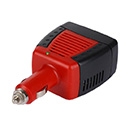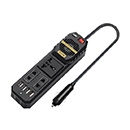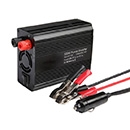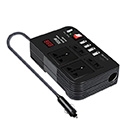In recent years, car inverters have become essential accessories for many vehicle owners. These devices convert a vehicle's DC (direct current) power to AC (alternating current) power, enabling the use of standard household electrical appliances on the go. Whether you need to charge your laptop, power up a small fridge, or use any other AC-powered device, a car inverter can be incredibly handy. With a growing number of options available on the market, understanding the price range and features of different car power inverters is crucial for making an informed purchase.
75W, 150W, 200W and 300W of car socket inverter can be provided in Inverter Online Store. For more detailed specifications, please move into the product page. Now we will show you the car inverter price list of Inverter.com below for your refererence.
Car Inverter Price List:
| Product | Power | Output Voltage | Frequency | SKU | Price |
 |
75W | 110V AC/ 220V AC | 50Hz/ 60Hz | ATO-C75W | $42.55 |
 |
150W | 110V AC/ 220V AC | 50Hz/ 60Hz | ATO-C150W | $56.94 |
 |
200W | 110V AC/ 220V AC | 50Hz/ 60Hz | ATO-C200W | $65.79 |
 |
300W | 110V AC/ 220V AC | 50Hz/ 60Hz | ATO-C300W | $69.71 |
 |
300W(digital display) | 110V AC/ 220V AC | 50Hz/ 60Hz | ATO-C300WD | $77.87 |
Note: Some of our hot selling car power inverters are listed in the table. The prices in the table are just for your reference. If you want to get the latest quotation, please contact us now.
Factors to Consider When Buying a Car Inverter:
Whether you're planning a road trip, need a mobile office, or want to ensure you're prepared for emergencies, choosing the right car portable power inverter is crucial. Here are several factors to consider when buying a car usb inverter to ensure you make an informed decision.
1. Power Requirements
- Wattage: Determine the total wattage of the devices you plan to power with the inverter. The inverter should have a continuous wattage rating higher than the total wattage of these devices. It's also wise to consider an inverter with a higher surge capacity for devices that require more power to start.
- Types of Devices: Different devices have varying power requirements. For example, a laptop may require 100-200 watts, while a small refrigerator could need 300 watts. Make a list of devices and their power needs to guide your decision.
2. Portability and Size
- Size and Weight: If you plan to frequently move the inverter between vehicles or use it in different locations, consider a compact and lightweight model. Larger inverters with higher power capacities tend to be bulkier.
- Installation Flexibility: Some inverters are designed for permanent installation in a vehicle, while others can be easily plugged into the cigarette lighter socket. Choose based on how and where you plan to use the inverter.
3. Number and Type of Outlets
- AC Outlets: Check how many AC outlets the inverter has. More outlets allow you to power multiple devices simultaneously.
- USB Ports: Modern inverters often include USB ports, which are convenient for charging smartphones, tablets, and other USB-powered devices.
4. Safety Features
- Overload Protection: Prevents the inverter from damage if you exceed its wattage capacity.
- Short Circuit Protection: Essential to avoid potential electrical hazards.
- Thermal Shutdown: Protects the inverter from overheating, ensuring long-term reliability.
- Low Battery Alarm/Shutdown: Alerts you when your car battery is low and shuts off the inverter to prevent complete battery drain.
5. Efficiency and Battery Drain
- Efficiency Rating: Higher efficiency inverters convert more of the DC power from your car's battery into usable AC power, reducing waste.
- Idle Consumption: Some inverters consume power even when no devices are connected. Look for models with low idle power consumption to preserve your car's battery.
6. Build Quality and Durability
- Materials: Inverters made with high-quality materials and robust construction tend to last longer and withstand harsh conditions.
- Cooling Mechanism: Efficient cooling systems, such as fans or heatsinks, prevent the inverter from overheating and extend its lifespan.
By considering these factors, you can choose a car lighter inverter that not only meets your power needs but also ensures safety, efficiency, and long-term satisfaction, and provides reliable performance for years to come.
